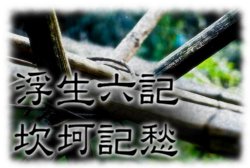Six Records of a Floating Life, 3: Kanke Jichou (Section 11)
 This is a sentence-by-sentence translation from the chapter 坎坷記愁 in Shen Fu’s 浮生六記 (Six Records of a Floating Life). It aims to be literal and close to the original text as far as possible, rather than be an idiomatic conversion to English.
This is a sentence-by-sentence translation from the chapter 坎坷記愁 in Shen Fu’s 浮生六記 (Six Records of a Floating Life). It aims to be literal and close to the original text as far as possible, rather than be an idiomatic conversion to English.
(See the index of Fu Sheng Liu Ji translations)
浮生六記 → 第六卷:坎坷記愁 → Section 11
余曰:「忘之矣。」 I said: “I had forgotten this!”
芸曰:「聞靖江去此不遠,君盍一往?」 Yun said: “I hear Jingjiang is not far from here - why don’t you make a trip?”
_盍 is like 何不 - 'why not'._余如其言。 I did as she said.
時天頗暖,織絨袍嗶嘰短褂,猶覺其熱,此辛酉正月十六日也。 At that time the weather was quite warm, and wearing a knitted woollen gown and a short woollen coat, I felt the heat even more; this was the sixteenth day of the first month of 1801.
_辛酉 is the 58th year of the sixty-year cycle. 嗶嘰 is 'serge', a tightly woven fabric. 猶 here is probably not 'still', but 'even more'._是夜宿錫山客旅,賃被而臥。 That night I stayed at an inn at Xishan; I rented bedding and slept.
_錫山 is the place [Xishan](http://en.wikipedia.org/wiki/Xishan_District,_Wuxi "Xishan District, Wuxi"). Shen Fu rented bedding as this is not necessarily included in basic lodging costs._晨起趁江陰航船,一路逆風,繼以微雨。 In the morning I used the Jiangyin ferry, but the whole journey was against the wind, and this was followed with fine drizzle.
_趁 means 'avail oneself of' or 'take advantage of'. 江陰 is the place [Jiangyin](http://en.wikipedia.org/wiki/Jiangyin "Jiangyin, Jiangsu")._夜至江陰江口,春寒徹骨,沽酒禦寒,囊為之罄。 At night we reached the mouth of the Jiangyin, and the Spring cold chilled me to the bone; I bought wine to resist the cold, and that used-up the contents of my purse.
_徹骨 is a binome meaning 'through to the bone'._躊躇終夜,擬卸襯衣質錢而渡。 I paced back and forth all night, considering if I should remove my undergarments and sell them for money to get the ferry.
_躊躇 is a binome meaning 'pace back and forth', 'dither' or 'waver'; here it's not clear if it's literal or not._十九日,北風更烈,雪勢猶濃,不禁慘然淚落,暗計房資渡費,不敢再飲。 By the 19th, the northern wind was even fiercer and the snow denser still; I couldn’t help but let tears fall in my distress; privately I calculated the lodging and ferry fees, and didn’t dare drink again.
_勢 here is probably 'circumstances', i.e. 'the force of circumstances from the snow'._正心寒股栗間,忽見一老翁,草鞋氈笠負黃包,入店,以目視余,似相識者。 Just as I was shivering to my very heart, I suddenly saw an elderly gentleman, wearing straw sandals and a felt hat, and carrying a yellow bag, walk into the inn; he looked at me as if I were an acquaintance.
_The 正 ... 間 structure here means 'just at the time when'. 心寒股栗 is four-character phrase, literally 'cold to the heart, thighs shivering'. The old man's clothing suggests poverty. 以目視余 is literally 'cast his eyes upon me' or 'used his eyes to look at me'._余曰:「翁非泰州曹姓耶?」 I said: “Aren’t you Mr Cao from Taizhou?”
_泰州 is the place [Taizhou](http://en.wikipedia.org/wiki/Taizhou,_Jiangsu "Taizhou, Jiangsu"), on other side of the river. The implication is that Shen Fu suspects this man will cross back over and may be able to accompany him._答曰:「然。我非公,死填溝壑矣! He replied: “Correct. If it weren’t for you, sir, I would be dead, filling a ditch!
今小女無恙,時誦公德。 Now my little daughter is healthy, and frequently sings your praises!
_無恙 is literally 'without affliction'. 公德 is not the binome 'public ethics', but 'your [polite] virtue. So literally this is 'reads aloud your virtues'._不意今日相逢,何逗留於此?」 I had no idea we would encounter each other today; why are you stopping over here?”
蓋余幕泰州時,有曹姓,本微賤,一女有姿色,已許婿家,有勢力者放債謀其女,致涉訟,余從中調護,仍歸所許。 This was a reference to when I worked at the government office in Taizhou, and there was a certain Mr Cao, originally very humble; he had a very beautiful daughter, who was already betrothed to a son-in-law to be, but an influential man loaned money, scheming for his daughter; it came to legal proceedings, and I mediated and protected them from this, and she returned to her betrothed.
_調 here is probably read tiáo, meaning 'reconcile' or 'mediate'._曹即投入公門為隸,叩首作謝,故識之。 Cao promptly jumped into service at the Yamen as a runner, kowtowing to express his gratitude; this was the reason that I was acquainted with him.
Useful links
- The full Chinese text of 浮生六記 (Project Gutenberg)
- Six Records of a Floating Life (Penguin Classics) on Amazon (a much more idiomatic translation)
Series: Six Records of a Floating Life
- Six Records of a Floating Life, 3: Kanke Jichou (Section 1)
- Six Records of a Floating Life, 3: Kanke Jichou (Section 2)
- Six Records of a Floating Life, 3: Kanke Jichou (Section 3)
- Six Records of a Floating Life, 3: Kanke Jichou (Section 4)
- Six Records of a Floating Life, 3: Kanke Jichou (Section 5)
- Six Records of a Floating Life, 3: Kanke Jichou (Section 6)
- Six Records of a Floating Life, 3: Kanke Jichou (Section 7)
- Six Records of a Floating Life, 3: Kanke Jichou (Section 8)
- Six Records of a Floating Life, 3: Kanke Jichou (Section 9)
- Six Records of a Floating Life, 3: Kanke Jichou (Section 10)
- Six Records of a Floating Life, 3: Kanke Jichou (Section 11) (this article)
- Six Records of a Floating Life, 3: Kanke Jichou (Section 12)
- Six Records of a Floating Life, 3: Kanke Jichou (Section 13)
- Six Records of a Floating Life, 3: Kanke Jichou (Section 14)
